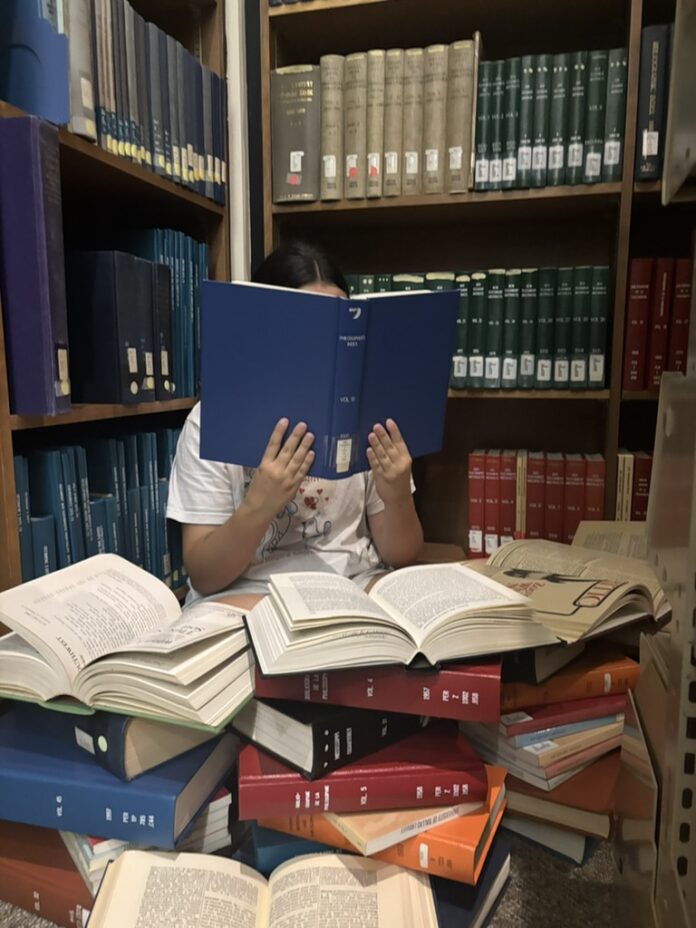At the end of their college career, most University of Dallas students know they’ll face Comps. Senior Spanish/pre-health major Elena Romero said, “Comps [or comprehensive exams] are tests that correspond to your specific major, testing you on all the topics you learned throughout your time at UD.” Students generally take Comps during their senior year.
Comps vary greatly by major in terms of length and format. According to Dr. Ellen Steinmiller, the chair of the chemistry department, all chemistry majors (those getting a Chemistry BA, Chemistry BS, or Biochemistry BS) take the same Comps. She said “The comprehensive exam is a standardized exam written by the American Chemical Society. The exam is called the DUCK (Diagnostic of Undergraduate Chemical Knowledge) […] It is a timed 2-hour exam…[and] is offered the first day of the spring semester.”
Senior Elena Romero described Spanish Comps “For Spanish majors, we actually have two different comps tests that survey different classes. It’s kind of like an intense lit trad test, but in Spanish. We learn thousands of years of Peninsular history, as well as Spanish American history. We read from many different poets and writers… we must memorize who they are, all their works we’ve read, their literary movement, literary devices and historical context.”
Mary Anne Panganiban, a business major who graduated from UD last May, said about her Comps: “Business Comps are set by the Undergraduate Business Department. There were two sections, multiple choice questions and a long essay…I think the total time we had was about three hours. But most of us finished in about an hour and a half.” She added “The Business majors don’t have a thesis. All senior business majors are required to take Strategic Management (Senior Seminar), where they complete a capstone project at the end of the class [which] focuses on solving a real-life business problem.”
Dr. Teresa Danze, chair of the classics department, said about the classics and classical philology comprehensive exam: “It’s three parts. One is an annotated bibliography, everyone has to write a thesis and so the bibliography is for the thesis. The second part is a history exam…several questions about different authors who speak about historical figures and historical events. […] The third part is a sight translation exam…you’re reading a passage at sight you’ve never seen before with no dictionary.”
Comprehensive exams for the English department happen over the course of two days in the early spring. The first part is a 90-minute test covering literary and poetic terms and identifying poetry quotations. The second part takes an entire day and tests students’ understanding of literary periods, technical analyses of prose and poetry and their ability to integrate works from different epochs of literary history.
Professors offer a variety of advice to students preparing for Comps. Dr. Drew Stenesen, chair of the biology department, tells biology students to “Reflect on the entirety of your coursework at UD and use what you learned to identify a topic within the field of biology that is relevant to you. […] Also, start early and talk to your professors about your ideas…We want you to succeed and we know the effort it takes to pass this exam.” Dr. Danze tells classics majors, “The best preparation [for Comps] is perhaps to keep all the materials from your different courses…Anything you have read in Latin or in Greek, I would say go back and reread those.” Dr. Andrew Moran, chair of the English department, advises students to “Study together…It’s the opportunity to bring the stuff that you’ve been studying for the past couple years together in your mind and by seeing everything one more time now after having been through the whole sequence of courses it’s an opportunity to arrive at new insights and a richer understanding, and that’s a lot of fun…Get together with your friends. Quiz each other…Get together in somebody’s apartment, crack open a bottle of wine, and just read poetry to each other.”
Alumna Mary Anne Panganiban said, “For the upperclassmen, make sure to take care of yourself as you study hard. All the studying in the world is useless if you neglect your health. Don’t put so much importance on your grades to the point where you equate your worth with your Comps score. No one is going to care outside of college, trust me. For the underclassmen, save your notes because they’ll be helpful later. Make sure you take care of your health as well, and soak up every moment you can amidst all the readings, exams and papers.”

